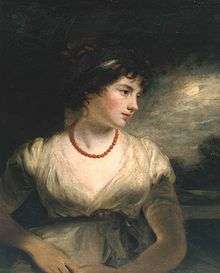Jane Harley, Countess of Oxford and Countess Mortimer
- "Lady Oxford" redirects here. You may be looking for Margot Asquith
| Jane Harley, Countess of Oxford and Countess Mortimer | |
|---|---|
 Painting of Jane Elizabeth Scott by John Hoppner (1797) | |
| Born |
Jane Elizabeth Scott 1774 |
| Died | 1824 (aged 49–50) |
| Spouse(s) | Edward Harley, 5th Earl of Oxford and Earl Mortimer |
| Partner(s) |
Francis Burdett George Gordon Byron, Lord Byron |
| Children |
Edward Harley, Lord Harley Alfred Harley, 6th Earl of Oxford and Earl Mortimer Jane Bickersteth, Lady Langdale Lady Charlotte Bacon Lady Anne Harley Lady Frances Vernon Harcourt |
| Parent(s) | Reverend James Scott, M.A. |
Jane Elizabeth Harley (née Scott), Countess of Oxford and Countess Mortimer (1774–1824) was an English noblewoman, known as a patron of the Reform movement and a lover of Lord Byron.
Life
She was a daughter of the Reverend James Scott, M.A., Vicar of Itchen Stoke in Hampshire and was brought up in favour of French Revolutionary thought and Reform. In 1794 she married Edward Harley, 5th Earl of Oxford and Earl Mortimer (with her father taking the service), being styled Countess of Oxford and Countess Mortimer. She was a friend of the Princess of Wales. She frequently took lovers from among the pro-Reform party during her marriage, firstly Francis Burdett and most notably Lord Byron (the affair lasting from 1812, in the aftermath of Byron's affair with Lady Caroline Lamb, when he was fourteen years her junior, until 1813, when she and her husband went abroad but Byron did not follow as she had hoped). Her marriage was not a love match and her large number of children were known as the "Harleian Miscellany" due to uncertainties over whether her husband was their father, but the marriage did not break up. Even in the easy-going world of the Regency aristocracy, her affairs were considered to have put her beyond the pale, and few people were prepared to receive her. Ironically, given their shared interest in Byron, Caroline Lamb was one of her few friends.[1]
Children
Among her children were:
- Edward Harley, Lord Harley (20 January 1800 – 1 January 1828).
- Alfred Harley, 6th Earl of Oxford and Earl Mortimer.
- Lady Jane Elizabeth Harley; married Henry Bickersteth.
- Lady Charlotte Mary Harley (b. 1801 or 1809, d 1880); in 1823 married Anthony Bacon.
- Lady Anne Harley; married Signor Giovanni Battista Rabitti Count St. George.
- Lady Frances Harley; married Lt.-Col. Henry Vernon Harcourt, Esq., the son of the Archbishop of York.
References
- ↑ Cecil, David. Melbourne Pan Books. 1969. p.90-91
Sources
- Byron's letters and journals, page 286
- http://www.blupete.com/Literature/Biographies/Literary/Byron.htm
| ||||||||||||||||||||||||||||||||
.jpg)